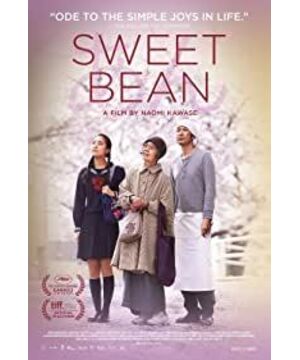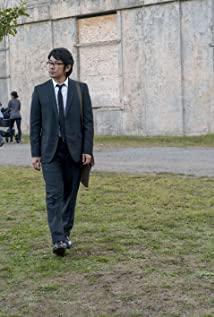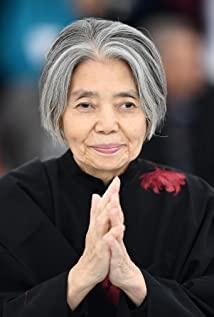This is a very emotional film, so the fly in the ointment is that many of the reality-related parts are not handled well, or even simply ignored. The result was a bug that greatly affected the viewing experience: Hiring lepers to work in the restaurant industry without checking any hygiene and health-related certificates. As mentioned in another review: it's not fair to the customer.
I personally feel that the theme of the film is the mutual redemption between Ms. Tokue and Chitaro and how leprosy is viewed. The former handles well. The latter was only mentioned in the movie, and Ms. Dejiang verbally told Qiantaro that the disease had been cured. Wouldn't it be better if I added a little more ink and let Ms. Tokujiang show Chitaro's medical records or the certificate issued by the doctor? After all, the combination of infectious diseases and food makes it impossible to be insensitive. In addition, if the focus on leprosy and lepers is the subject of the letter that the film wants to convey, then the film gives too little information. People are aware of the danger and contagiousness of the disease, but the safety of contacting leprosy patients at different stages is not clearly explained. If Ms. Dejiang's condition has been controlled and she is not afraid of contagion, why was she isolated and recuperated from her teenage years until she died and could not return to society? If she is still contagious, is it safe for consumers to leave the nursing home and work in the restaurant industry?
The biggest flaw in the movie for me is the leprosy part. In general, I like it. The story and structure are relatively complete, and the emotional relationship between the characters is also clearly explained. I really like the feeling that Ms. Tokue and Chitaro are strangers but guide and care for each other like family. This kind of intimacy between strangers is sometimes more comfortable than true kinship, because it has more than the usual kinship of the most basic respect between people and less of it because of excessive identification with one's own children or The arrogance and willfulness of parenthood.
Another thing I really liked about the movie is that there are two characters, Chitaro and Hakana. One is a middle-aged man who works part-time for others in order to pay off his debts, and the other is a middle school girl who is pure and bright in her heart despite many problems in her life. These two characters almost went through the acquaintance, acquaintance and parting with Ms. Dejiang together. They showed a different attitude towards each event. Chitaro always has a rational and forbearance when facing Ms. Dejiang and leprosy. My interpretation is that this is an attitude that has been disciplined and influenced by society (there is no praise or derogation here), and the source is more mature way of thinking. ワカナ will always accept Ms. Dejiang in a more open and simple way. When the two characters are in the same scene, the contrast is very obvious, ワカナ is basically in a very well-lit position, or her face will be directly in the sun. And even if Chitaro is sitting next to ワカナ, he is usually in a darker position, and sometimes his hair blocks the light that hits his face. Although the attitudes shown by the two are different, they have the same core, which is kindness. Chitaro, like Hakana, wants to accept Ms. Tokue in his heart. This idea is contrary to his concerns about leprosy, so he can only hide many things. If Chitaro's attitude towards Ms. Tokue represents reality, then ワカナ may represent a more idealized state that we pursue when the whole society can have enough awareness of leprosy or infectious diseases. But in fact, how to interpret these two characters can be, simply understood as the attitude of adults and minors to see things.
While I really like this movie, I think it really pays more attention to depicting the emotional part, which is very idealistic. Including "get out of the current state of life that you don't like and do what you like" that the characters in the play have always mentioned, it is more about conveying a sense of awareness. There's nothing wrong with being emotional, and in reality, some people have the conditions to get out of the predicament of life, but we often forget that we still have this path to choose from (we won't discuss people who really have no exit in the predicament of life), then there is such a movie. Movies remind us that it's good to try a different way of life. But since I chose to discuss the topic of leprosy in the movie, I think the plot should be more rigorous.
Speaking of which, I think of the news about the hiring of mentally ill people to make bread in China, it seems that it will be interesting to make a movie. While a good story may turn into a movie in a foreign country, it usually ends up in a lukewarm news report in China.
View more about Sweet Bean reviews










